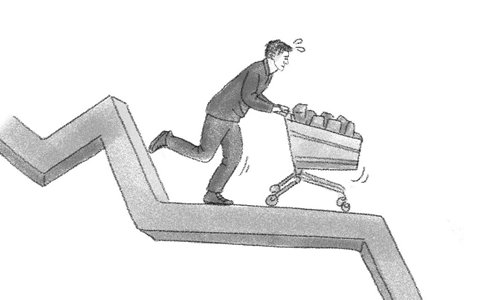HOME >> BUSINESS
Europe, US show signs of Japanese-style recession
By Chen Hongbin Source:Global Times Published: 2019/7/22 18:43:40

Illustration: Xia Qing/GT
Even recently, many people were still optimistic that European countries and the US were unlikely to become "Japanized." Some mainstream economists argued that even if low growth, weak inflation and low interest rates all arrived at the same time, policymakers would have enough in the toolbox to deal with it. They even suggested that the Japanese must take bold measures, otherwise it would be impossible for the country to get rid of its old economic development model. "Japanification" is seen as a major decision-making mistake, but not inevitable.
However, it turns out that the above-mentioned view is just blind, groundless optimism as Europe and the US are still haunted by the specter of "Japanification." After the 2008 global financial crisis, economic recovery in Europe and the US was much slower and showed less tolerance than most policymakers, politicians and economists had expected.
In particular, Europe is re-entering a worrying regional economic slowdown. The European Central Bank continues to revise down its growth forecasts, recognizing that its inflation target was excessively optimistic. Previously, eurozone growth for the year was projected at 1.9 percent, which was then lowered to 1.3 percent in February and 1.2 percent in June. In April, the IMF's World Economic Outlook report also slashed its forecast for eurozone growth by 0.3 of a percentage point to 1.3 percent for this year and 1.5 percent for 2020.
As the EU bellwether, Germany is forecast to see a 0.5 percent gain this year, according to the European Commission's projection. In March, the German manufacturing purchasing managers index (PMI) was only 44.1, the lowest point since 2012, far below the 50 line.
The same is true with the OECD forecast issued in March, which revised eurozone growth to 1 percent for this year and 1.2 percent for 2020. The IMF forecast for US growth was also lowered to 2.3 percent for 2019 from 2.9 percent in 2018, and its 2020 growth forecast only stands at 1.9 percent. Adam Posen, president of the Peterson Institute for International Economics pointed out in April that "Europe's Japanification is a real risk" and that he is very worried about it. The Bank of America and Societe Generale also issued reports about the eurozone turning Japanese.
With yields on government bonds declining, global transactions of negative-yield securities totaled more than $10 trillion. In the meantime, Japan is approaching its fourth consecutive decade of sliding nominal growth, inflation and interest rates. In the US, more and more economists are concerned about the upcoming economic slowdown. Some are urging the Fed to cut interest rates, while others are calling for the Fed to set a higher inflation target to hedge the risk of excessive deflation.
The worries surrounding "Japanification" derive from reasonable concerns over structural inflation-restraining factors, which may directly or indirectly lead to lower inclusive growth. These factors include an aging population, increased inequality (in terms of income, wealth and opportunities), social and economic insecurity among various groups and distrust of institutions and expert opinions.
These structural factors have led to declining demand, increased risk aversion and self-protection and weakened growth momentum. While the economic effects of innovation in artificial intelligence, big data and circulation of products may not be that obvious, they could at least help reduce barriers for industries.
Growth could be weakened by various factors, and the process is often overlooked. For example, sustained low interest rates or even negative interest rates often erode the institutional integrity and operational efficiency of the financial system, thereby cutting bank lending and limiting insurers from offering long-term products to households. Another indirect impact comes from expectations of the future. If growth and inflation rates remain low for a long time, households and companies tend to put off their consumption and investment decisions, thus prolonging the period of low growth and low inflation.
The reason why Western economists initially underestimated the threat of "Japanification" is because they played down or simply ignored its direct and indirect impacts. Looking back, they may be surprised to find that countries with a rapidly aging population and relatively small number of immigrants are those fighting "Japanification." These economists believe that policies can play a decisive role in determining macroeconomic results, but they often focus too much on monetary policy and overestimate its effectiveness.
The effectiveness of monetary policy is limited when other "liquidity trap" factors exert an impact. Quantitative easing and other large-scale balance sheet operations may buy some time through injecting more liquidity into the financial system, but this approach cannot solve the fundamental problems, and will bring a series of costs, associated damages and unintended consequences.
The author is an associate research fellow with the Shanghai Institutes for International Studies. bizopinion@globaltimes.com.cn
Posted in: INSIDER'S EYE